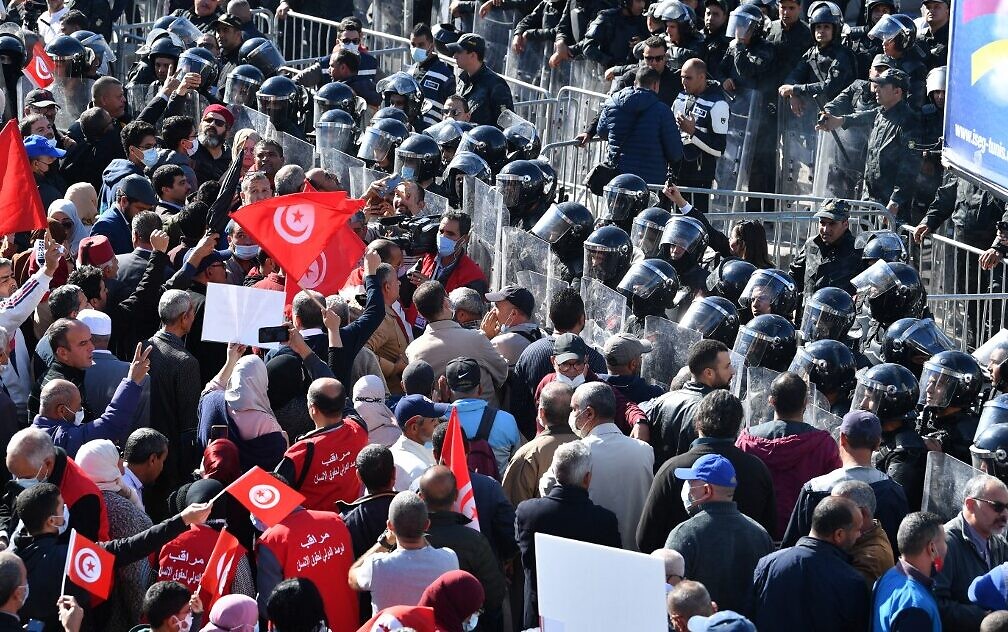
This Sunday, just shy of 100,000 Tunisians rallied on the streets of their Capital City Tunis, calling for the return to Democracy after the nations President Kais Saied seized power and overturned Tunisia’s parliament. After promising to return to a democratic system, Saied has so far failed to do so and looks only to be positioning himself to serve Western interests.
President Kais Saied took complete power in Tunisia, making himself a de-facto dictator according to his critics, on July 25, vowing to restore the democratically elected parliament in less than a month. He later went back on his word and claims that he had acted in accordance with the country’s constitution, announcing that he would rule by decree before instating a new Prime Minister.
Egyptian coup-leader, President Abdel Fattah al-Sisi, has now pledged his support for President Saied and it seems as if what was originally feared may be emerging; that the UAE, Saudi Arabia and other Persian Gulf Regimes are seeking to exploit this takeover and work with the President.
Prior to the Tunisian revolution in 2011, which sparked the beginning of what became known as the ‘Arab Spring’, relations between long time Dictator, President Zine El Abidine Ben Ali, and the Persian Gulf regimes had been strong. But after the overthrow of Ben Ali, the likes of the UAE and Saudi Arabia took a very different approach, which was in large part to do with the influence of the Muslim Brotherhood (MB) over Tunisia.
When interviewed by the Algerian newspaper Al-Khobar in 2019, former MB aligned Tunisian President, Moncef Marzouki, made claims that the United Arab Emirates had conspired to crush the Tunisian revolution and reverse its effects. “I never imagined that a country like the UAE has animosity for us to this degree. They set terrorism upon Tunis, and it is funded terrorism. They unleashed corrupt media on us, to make the Arab Spring experiment fail,” Marzouki had stated at the time.
In October, Moncef Marzouki called for Tunisians to take to the street and demand the end of President Kais Saied’s power grab, he also urged the likes of France to withdraw their support from the President. This resulted in President Saied withdrawing the diplomatic passport of his predecessor and declaring him as an agent acting against the State.
In Tunisia there are two primary sides that are working to seize power in the country, the Muslim Brotherhood and the Arab reactionary regimes, led by Saudi Arabia and the UAE. There have long been attempts by the UAE primarily, to meddle in the internal affairs of Tunisia, but all prior attempts have proved futile. Whilst for the MB, they largely depend upon funding from their large support base in the country, in a similar manner to the way they backed former Egyptian President, Mohamed Morsi, to come into power.
With the failure of the Muslim Brotherhood to claim victory over Bashar al-Assad in Syria, they wasted a lot of resources. They still operate out of their powerhouses, Turkey and Qatar, but in the likes of Sudan and Egypt they were successfully removed with the help of the UAE, Saudi Arabia and Kuwait.
When Kais Saied seized power in late July, his forces were quick to target the offices of Al-Jazeera, the State-funded media outlet of Qatar. Al-Jazeera is clearly pro-MB in its outlook and so Saied targeting them sent a clear message. It is interesting that whilst the allies of the MB have been cracked down upon and also seem to be the most vocal in opposition to President Saied, there has been little effort to combat forces favorable to the UAE-Saudi bloc.
The selection of Najla Bouden to become Prime Minister, by Kais Saied, gives a clear indication of the President’s willingness to impress the Western world and follow the Arab reactionary regime agenda. Having the Arab world’s first female PM is nothing more than posturing and signaling to the West that Saied is ready to play their game. It also gives him something to brag about and make himself seem progressive to a Western audience. But instead of it being a real statement in the Arab world, the fact that this did not come as the result of a democratic system is only counterproductive.
There is currently no way to prove that President Saied is acting on behalf of the UAE and Saudi Arabia, but if the MB pressure and/or the pressure from larger society comes to bare, then we will likely see the picture become more clear. In the case of Egypt’s current President Sisi, a dictator and coup leader, it was not immediately apparent where his backing came from, but as time went on, the suspicions of many analysts were verified, with the paper trail leading back to Abu Dhabi and Riyadh.
Related posts:
Views: 0
 RSS Feed
RSS Feed

















 November 17th, 2021
November 17th, 2021  Awake Goy
Awake Goy 




 Posted in
Posted in  Tags:
Tags: 
















